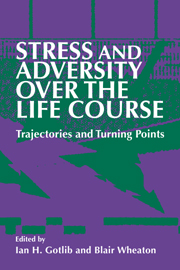Book contents
- Frontmatter
- Contents
- List of contributors
- 1 Trajectories and turning points over the life course: concepts and themes
- I Trajectories: long-term effects of adverse experience
- 2 Childhood adversity and adult psychopathology
- 3 The impact of twenty childhood and adult traumatic stressors on the risk of psychiatric disorder
- 4 Intergenerational sanction sequences and trajectories of street-crime amplification
- 5 School-leavers' self-esteem and unemployment: turning point or a station on a trajectory?
- 6 Intergenerational consequences of social stressors: effects of occupational and family conditions on young mothers and their children
- 7 Women's roles and resilience: trajectories of advantage or turning points?
- II Turning points: changes in life trajectories
- III New methods for the study of the life course
- Index
2 - Childhood adversity and adult psychopathology
from I - Trajectories: long-term effects of adverse experience
Published online by Cambridge University Press: 23 October 2009
- Frontmatter
- Contents
- List of contributors
- 1 Trajectories and turning points over the life course: concepts and themes
- I Trajectories: long-term effects of adverse experience
- 2 Childhood adversity and adult psychopathology
- 3 The impact of twenty childhood and adult traumatic stressors on the risk of psychiatric disorder
- 4 Intergenerational sanction sequences and trajectories of street-crime amplification
- 5 School-leavers' self-esteem and unemployment: turning point or a station on a trajectory?
- 6 Intergenerational consequences of social stressors: effects of occupational and family conditions on young mothers and their children
- 7 Women's roles and resilience: trajectories of advantage or turning points?
- II Turning points: changes in life trajectories
- III New methods for the study of the life course
- Index
Summary
This chapter presents an overview of research that we have been pursuing for the past several years to study the long-term effects of childhood adversity on adult psychopathology. This work involves secondary analysis of three largescale population surveys of adults wherein retrospective reports about childhood adversities are related to reports about adult psychiatric disorders. Although this work is still in progress, preliminary results are sufficiently compelling to warrant presentation. We begin with a brief review of previous research in this area and then turn to a discussion of our main findings to date.
Introduction
Previous research
Much evidence from a wide variety of studies in both psychiatric patient samples and general population samples confirms that adults who were exposed to adversity during their childhood years are more likely than the unexposed to have adult psychopathology (e.g., Birtchnell, Evans, & Kennard 1988; Brown& Anderson 1991; Bryer et al. 1987; Earls et al. 1988; Faravelli et al. 1986; Fendrich, Warner, & Weissman 1990; Holmes & Robins 1988; McLeod 1991; Rutter 1989; Tennant 1988; West & Prinz 1987). However, these studies surfer from several limitations. First, the vast majority focus on only a single aspect of adversity at a time. For example, there have been separate studies of the effects of poor maternal care (e.g., Parker 1984; Plantes et al. 1988), death of or separation from a parent (e.g., Faravelli et al. 1986; Tennant 1988), family violence (e.g., Fergusson, Dimond, & Horwood 1986; Hess & Camara 1979), and parental substance abuse (e.g., Weissman et al. 1987; West & Prinz 1987).
- Type
- Chapter
- Information
- Stress and Adversity over the Life CourseTrajectories and Turning Points, pp. 29 - 49Publisher: Cambridge University PressPrint publication year: 1997
- 29
- Cited by



